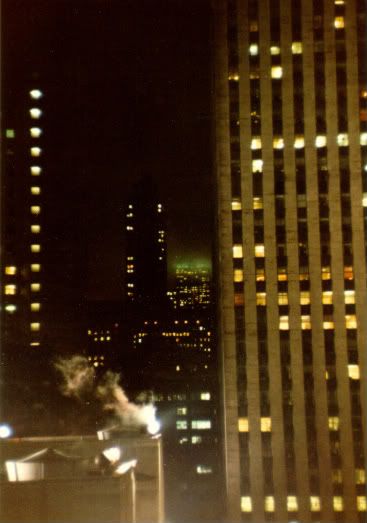Wednesday, August 04, 2004
Passages
NY Daily News: Mets' Announcer Bob Murphy dies at 790 comments
and
Voice of the Mets passes away
Bob Murphy's voice wasn't the first voice I heard on a New York Mets' broadcast in 1962—that voice belonged to one of his partners, the dean of this new broadcast team, Lindsey Nelson.
But Bob's lasted most consistently and for the longest time.
Nelson was grace and professionalism personified. Ralph Kiner had a former player's eye for the game and a treasure trove of great stories, and enough malaprop-isms to turn into a signature style.
Bob Murphy was in love with, and in awe of, everything baseball. I can only imagine he was the same way with life.
I started listening to Murphy, Nelson and Kiner during the Mets' inaugural season—when I was 11, an age when every moment of existence is immense. And they had just created a brand new major league baseball team! In New York City! How immense was that? The Murph seemed to feel the same way.
While never a partisan home team rooter, or the dreaded "homer," he still always conveyed that every Mets' opponent was possessed of extraordinary skills: every opposing pitcher was "marvelous" and had "dominant stuff", every enemy hitter was "a marvelous hitter," and exhibited enormous power, speed and bat control. The Mets seemingly always faced insurmountable odds. Yet through this crucible came a never-ending stream of young and aging New York Mets, skilled, able and ready for the challenge. They also were "marvelous" young pitchers and hitters.
Of course, being a slow child, it took me until I was 19 or so before I realized that, no, a lot of these Mets' prospects and veterans, about whom Bob found nice/kind things to say, weren't all that skilled or particularly able. As a kid, I was always wondering how it could be that all of these amazing young propects moving through the Mets' farm system to the big leagues could be traded to other teams and never seem to prosper as major league-caliber stars.
But Murphy made you listen. No matter your age. No matter your station in life. No matter the state of the world. No matter where you were.
I remember more than one occasion when a trip to the market, or even to a club or restaurant's Men's Room would include a period of prolonged lingering, after all duties were accomplished, listening to the transistor radio belonging to the counterperson or the Washroom Attendant, or the big radio coming from the big kitchen at the bottom of the stairs, next to the phonebooth and the restrooms.
In these blue-collar places, there was always the sound of Bob Murphy—telling the story of some excruciatingly important moment in a ballgame, which he was watching and you were missing. It didn't matter if it were the playoffs in October or an unimportant game on a Tuesday night in June, there was always drama and an urgency about the situation he saw before him. He'd force you to stop, hanging on what was to happen next. Often, others collected with you, caught by the moment as well. "What's the score?" stands as the official NYC motto. Then you'd hear the pitch or the batter or the inning resolve itself, related in Murphy's singular style, allowing you all to breathe again, to smile and to nod to each other, then off you all went, back to rejoin your respective lives.
This could and did happen at places like Tavern on the Green, as well as the grungiest coffee shops and hot dog stands in New York City. Didn't matter. Junkies or bankers, everyone bonded listening to the Murph.
If he could do that with a simple summer ballgame, his true power was in a championship game. He was truly Mr. October.
The famous 16-inning Game 6 of the 1986 NLCS against the Houston Astros remains as much notorious for the fact that this early afternoon game collided with NYC's evening rush hour as it was for Bob's now world-famous call of its ending. New York City stopped dead in its tracks at 5 o'clock—it was only the 10th inning, and in the 9th inning, the Mets had tied up a game that was certainly lost; so no one moved; no one rushed home. The streets of midtown were deserted. Almost every NYer was clumped with scores of other NYers—friend, foe and total strangers—glued to a radio someone had, hanging on Bob's account of the game, everyone rising and falling with every pitch, through every torturous extra inning. Millions were terrified that he or she would be in the subway or in a LIRR train tunnel when whatever momentous thing we all knew was coming happened. After Bob's famous call, after 6:30 pm or so, if I recall correctly, midtown Manhattan exploded. People held captive by the game for hours came pouring out of office towers, stores, bars, shops, wherever they had been, now all trying to "get home." The sidewalks were a party, akin to New Year's Eve—hundreds of thousands of people laughing and smiling, shouting "Let's Go, Mets!" to total strangers as they passed. It was a New York Carnavale. A magical moment when all of New York bonded in a way I had never seen to that point, and have never seen again other than, in a different form, on 9/11.
Consider it Murph's fault.
A few years ago, he said something that has stayed with me. And probably always will.
It was a hot miserable night against a team I don't remember. I don't even remember the play. He and his last partner, Gary Cohen, were sitting, relating a fairly hum-drum ballgame. They were doing their utmost to breathe some life into this dull game when something exciting and unique happened. Cohen called the play, but when he was done, Murphy chimed in, sounding duly stunned.
"This is what I love about the game of baseball: Just when you think you've seen everything there is to see, you see something that you've never seen before!"
Not only did Murphy's awe of baseball that night match my own, but it's stayed with me as one of the most profound statements about the awe of life I've ever heard.
So, to Bob Murphy, whose voice always seemed to be coming "from over there, somewhere" in your life: from some distant window, from the neighbors' backyard, from a stoop down the block, from a car stopped at a red light, from some beach blanket twenty yards from yours, from the boardwalk somewhere, from the hot dog stands, the gas stations and, yes, even from the restrooms and kitchens of our lives, I say, Thank You, Bob, for having been there for all of us. And for allowing us to share your awe.
posted by Gotham 3:37 PM
0 Comments:

